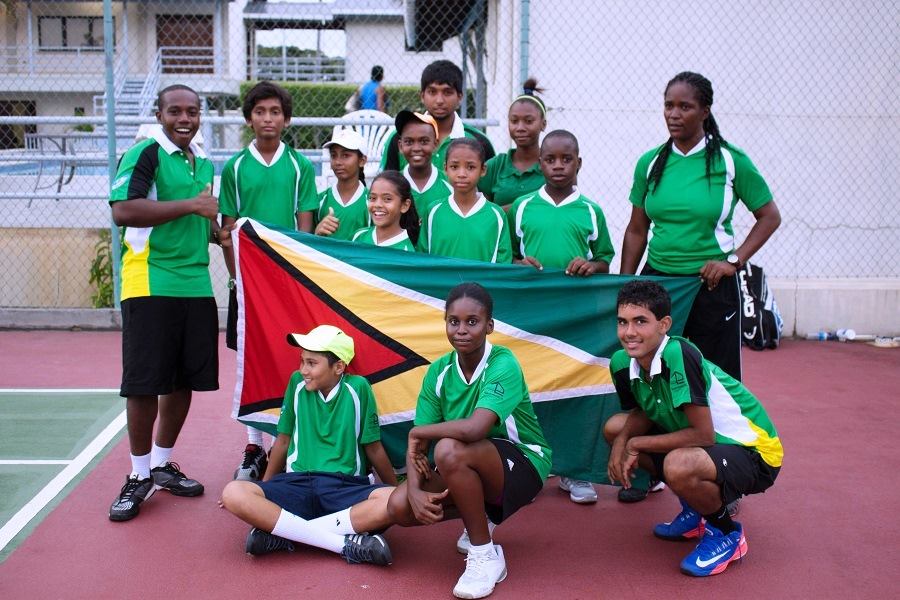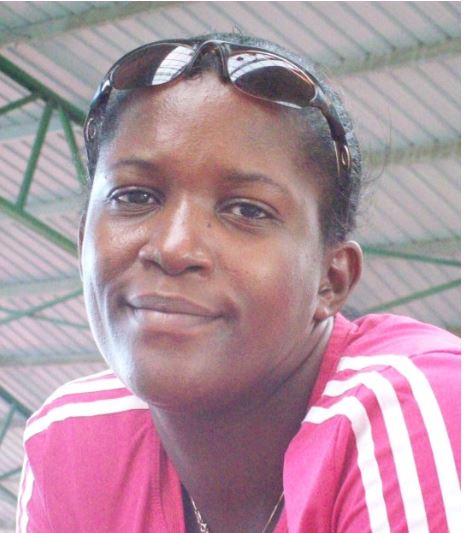The 14th of 16 siblings raised by a protective single mother in Guyana, Shelly Daly-Ramdyhan’s household was not flush with funds. Ball games were not a priority – as a child, she had no idea tennis even existed.
“No!” she said with a laugh when asked if she began playing as a junior. “I just happened to fall into tennis at 19 years old.” Her sister was introduced to the game by a tennis-playing friend, “and I just happened to follow her.”
Daly-Ramdyhan was hooked, but there were formidable obstacles to pursuing the game. “My mom never allowed us to do stuff outside of the home, so I would literally get away, try to sneak out, and not show evidence of doing that.”
For six months, she played barefoot on hard courts, not divulging her whereabouts or her need for tennis shoes to her mother, who couldn’t afford them in any case. “Because of that I was recognised by a lot of very good people that supported me.”
Fast-forward over 25 years, and Daly-Ramdyhan is now Guyana’s national coordinator of tennis programmes and runs her own private coaching business that feeds into the national system.
Her coaching journey began in 2005 with an invitation to the first junior programme in her home country, and in 2010 she attended her first regional conference in El Salvador.

At the 2019 Worldwide Coaches Conference in Bangkok, colleagues orbited around Daly-Ramdyhan. Amid the hustle and bustle of the busy conference suites, she exuded calm, low-key leadership.
“I like the interaction and the fact that you have three rooms,” she said of the 2019 WCC. “The only disadvantage is that you don’t get to cover as many areas [during breakout sessions] as you would like to, especially if you’re travelling alone.
“But this round table, the fact that you’re interacting more on a one-on-one basis with the speakers, I’m really impressed with that. Also the topics, I was really impressed with them.
“I liked the fact that females are now more in the forefront and I really enjoyed the round table [discussion on women coaches]. They were able to bring out a lot more of what happens in female tennis, some of the issues that were always there and were never looked at. It’s more out in the open.
“I remember in Mexico [at the 2015 WCC] when Judy Murray was one of the speakers, she challenged the ITF to have more female involvement. I guess she’d be happy with what [she would have] seen here. Still, I’d like to hear more from women speakers.
“And generally, you get to meet with [coaches from] different nations and hear their issues and you can compare with your nation. That’s a good thing.”
Those first impressions of the game as a barefoot latecomer entering the exclusive and less-than-welcoming atmosphere have stayed with Daly-Ramdyhan, who is driven by dismantling obstacles to the game so that players won’t discover tennis too late, as she did.
“It was only the elite playing at the club that I started at,” she said. “Even though it was kind of public, there were still restrictions getting in to play if you didn’t have money.
“Because of that I have a passion for grass-roots tennis. It’s important for me, personally, to give back to kids. That’s where most of our talented kids now are from, the grass roots.”

There are signs of improvement in the Guyana tennis landscape, not least Daly-Ramdyhan’s own daughter Nicola, who earned a tennis scholarship to Clark Atlanta University in the US in 2018.
At the GTA AGM in 2019, president Samuel Barakat noted their newly-certified ITF Level 1 and Level 2 coaches, the launch of the nationwide Junior Tennis Initiative schools programme assisted by ITF funding, and formation of the Guyana Coaches Association.
“We have seen our little successes here and there, coming from a nation that isn’t really recognised for tennis,” Daly-Ramdyhan said. “We have some players on scholarships – my daughter was lucky in that area – and we have the first player from Guyana selected to be part of the ITF under 12s training team. For me that’s a big plus. We’re going to use her now as a model for the rest of the team.”
Facilities remain the nation’s biggest issue, with 10 registered tennis clubs and just 27 courts, according to the ITF Global Tennis Report published last year. But Daly-Ramdyhan’s humble beginnings also make her an empathetic example to her players.
“I tell the kids: if I can do it from nothing, with what we have available to us, let’s do that,” she said. “I’m pushing to get the government back home to resurface the courts. We don’t have access to a lot of private courts, so that’s a big challenge for us. Nevertheless, their mindset now is: ‘Don’t worry about the bad courts, we still want to go there and play.’”
A mother of three girls, with a diploma in building and construction, Daly-Ramdyhan has packed a lot into her 47 years. “Don’t ask me how I did it!” she laughs. “It’s just a crazy passion that I have. I grew up with my mom wanting the best for us. One thing she said kind of stuck in my head: ‘It’s not where you come from but where you want to be.’ That’s how I treat my life. I have big goals. I dream a lot.”
Racially diverse Guyana, with a population of less than a million, is the only English-speaking nation of South America and one of the poorest. Although now materially well off compared with her deprived childhood, Daly-Ramdyhan sees it as her mission to take the game to the less-fortunate, rather than enrich herself.
“People look at me and see all polish,” she remarks, “But I’m like, ‘Don’t look at that. It’s not about that.’ I don’t believe in people wanting to showcase themselves with material things. For me, at home I go looking for the kids that are less fortunate. I like to go to their homes. I prefer that to fancy palaces.
“Even though I’m happy to be in a better place, even though it’s better with my children, I say to them, ‘Understand, it’s not about material things.’ At home I try to be as normal as possible. I like it very simple.”
As a player, Daly-Ramdyhan describes herself as “very passionate, very aggressive.” Mary Pierce’s presentation in Bangkok resonated with her: “She was one of my favourite players back in the day. To hear her saying she would go out there, her dad would push her and she went to the extreme to get what she wanted, it reminds me of myself.
“I always thought you need to be this Serena Williams kind of concept [of success],” Daly-Ramdyhan recalls of her own approach to tennis. “When I was competing, I was giving it 100 per cent and always believing that I can win.”
As a coach, success involves constant learning and improvement, rather than just wins and losses. Tennis for Daly-Ramdyhan is a vehicle for self-esteem and self-improvement: “At the end of the match, if you don’t win, it’s fine because the next day you can go back and try to better yourself.”
Coaching is also a way of repaying the faith once shown in her. “When I started I didn’t even know if I wanted to be a coach,” she admits. “I just know I need to give back. My coach did it for me. There are a lot of coaches who believed in a 19-year-old with nothing, that I could make something of myself.
“I was listening to one of the speakers [at the conference] who said, ‘Juniors don’t know what is in them until they are given the opportunity.’ I smiled to myself; that’s me.”
For an accidental tennis coach, Daly-Ramdyhan now can’t imagine a life outside the game. “My siblings are like: ‘You don’t have a life! Everything around you is about tennis!’ But that’s where I’m most comfortable. I could have chosen to go into an office job. But this is what I’m supposed to do – be out there on the court. I could be wrong, but so far it’s working.” (ITF)












